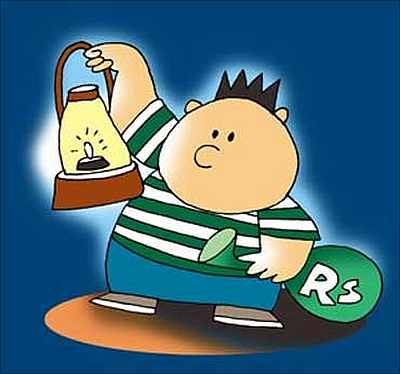 | « Back to article | Print this article |
BJP wants to do away with Income Tax; is it practical?
The Bharatiya Janata Party's proposed banking transaction tax is ill-conceived and inadvisable but it is disruptive enough to raise questions about the perverse nature of India's current tax regime and the need to reinvent it, says Rajiv Shastri.
Over the past couple of weeks, discussions on taxation have occupied an increasing portion of popular discourse.
The primary reason for this has been news reports suggesting that the Bharatiya Janata Party is "considering" the Arthakranti proposal to replace all direct and indirect taxes with a banking transaction tax.
As expected, public discussions on its feasibility have focused on revenue replacement.
This spotlight on fiscal implications has sidelined the economic perspective of the proposal.
Click NEXT to read more...
BJP wants to do away with Income Tax; is it practical?
In modern times, there are just two kinds of resources; labour and capital, which can be distinguished based on transferability of ownership.
After the abolition of slavery, ownership of a person's labour became unalienable from the person, making it non-transferable.
However, labour can be rented out for "wages" with individuals retaining the right to choose to whom they rent their labour.
Capital, on the other hand, consists of everything that can be owned by another, and transferred. By definition, this includes everything from money at one end of the liquidity and tangibility spectrum to intellectual property at the other.
Click NEXT to read more...
BJP wants to do away with Income Tax; is it practical?
All private capital is first created through savings from labour income. Once created, capital can either be consumed or used to generate further income.
A direct tax regime decides how income generated from these two avenues is taxed, and whether the tax structure supports the nation's current economic reality and future direction.
A popular format is to tax all income from labour, but exempt or treat beneficially income generated from capital.
This is based on the premise that since capital itself has been created from post-tax income, taxing the fruits of this post-tax capital amounts to double taxation.
Such regimes subject income from capital to a lower tax rate, but more importantly, differentiate between labour and capital in how taxable income itself is calculated.
This may sound familiar since the current Indian tax regime bears this tilt.
Click NEXT to read more...
BJP wants to do away with Income Tax; is it practical?
Taxable income from capital is typically calculated as excess of income earned over the expenses required to generate it.
As such, it is the amount saved that is taxed. Firms, which may be seen as a body of capital which rents both - labour and other capital - to achieve their goals, also pay tax only on profit or savings.
On the other hand, taxable income from labour is the total income earned. While our tax regime contains some allowances and exemptions; for most people these are nowhere near the expenses necessary to earn their wages.
Click NEXT to read more...
BJP wants to do away with Income Tax; is it practical?
Such expenses necessarily include expenses on food, clothing, shelter and all other expenses of a magnitude consistent with one's official position.
As such, the tax treatment of income from labour is akin to taxing a firm on total sales after some standardised deductions, rather than profit.
Such a tax regime militates against the opportunity to create fresh capital by exceptionally heavy taxation at the point of creation itself.
In addition, it perpetuates inequality by allowing current owners of capital to retain a relatively larger portion of their income. In effect, those earning income only from labour fail to build wealth while the already wealthy get wealthier.
Click NEXT to read more...
BJP wants to do away with Income Tax; is it practical?
Given our tax regime, it's no surprise that this sounds familiar as well. Even more unfortunately, the proposed Direct Tax Code does nothing to address this shortcoming either.
Apart from being blatantly unfair, our current tax regime is completely out of sync with our economic reality.
How can our country, which is admittedly short of capital, have a tax regime that inherently prevents its creation?
It is apparent that our tax regime needs to change. But is the Arthakranti proposal a viable answer?
Click NEXT to read more...
BJP wants to do away with Income Tax; is it practical?
While its revenue replacement proposal has been hotly debated, most doubters have approached it superficially and failed to account for lower collection expenses, freeing of government capital resources and the gains that accrue to individuals and small businesses freed from filing returns and maintaining accounts.
However, since the fiscal impact isn't the focus of this note, let's look at the economic suitability and dangers of such a regime.
First, it is transparent, simple to understand and easy to implement. The exact tax implication of each transaction is known in advance and isn't based on the whims of individual officials.
Click NEXT to read more...
BJP wants to do away with Income Tax; is it practical?
With collections outsourced to institutions with existing infrastructure, the cost of collection is lower compared to the current system of dedicated infrastructure for each type of tax.
Secondly, it encourages those in the lower income spectrum to enter the banking system.
For example, household help and chauffeurs who currently prefer to be paid in cash may prefer to receive their wages through bank transfers, pay a small tax, build a financial track record and gain eligibility for credit and other advanced financial services.
On the face of it, the comprehensive proposal, which includes the discontinuation of higher denomination currency notes, has many positives. Also, it appears to level the field between labour and capital by taxing all transactions equally. However, some aspects of the proposal indicate a lack of deeper thought.
Click NEXT to read more...
BJP wants to do away with Income Tax; is it practical?
For one, the proposed system isn't progressive. It burdens the poor in equal measure and is patently unfair in an economy characterised by ridiculous levels of inequality.
Secondly, the proposed system is not amenable to the transfer of resources from one jurisdiction to another.
As a result, poor states and towns will suffer from lower collections than earlier while regions such as Mumbai and the NCR gain, perpetuating the existing inequality.
Third, while the discontinuation of higher denomination notes may discourage cash transactions denominated in the national currency, nothing prevents the emergence of alternate currencies.
If people were to start using, say, gold, to conduct high value transactions outside the system, it would effectively require "police state" type restrictions to stop them. The suggestion that such transactions be denied legal enforceability may prove a minor hindrance and comes with the danger of the emergence of extra-legal enforcement mechanisms.
Click NEXT to read more...
BJP wants to do away with Income Tax; is it practical?
It is possible that such concerns may just prove to be fears if the transaction tax is kept at an acceptably low level. For a variety of transactions, the suggested rate of two per cent seems to fit the bill.
However, the revenue neutrality of this rate is based on the assumption that all types of transactions will be taxed when there is a large category of transactions that cannot possibly support it. This brings us to the fourth, and possibly fatal, flaw in the proposal.
The proposed transaction tax will make most financial investments unviable. An effective transaction tax of at least four per cent (two per cent each for buying and selling; more if transaction is routed through intermediaries) would result in financial markets grinding to a halt with all accompanying consequences.
Click NEXT to read more...
BJP wants to do away with Income Tax; is it practical?
While this can be addressed by exempting transactions between investors and specified financial institutions, such an exemption will reduce tax eligible transactions and sacrifice the revenue neutrality of the proposal.
This is the proverbial "rock and hard place" kind of quandary, one without an apparent answer.
So, while it is clear that India's current tax regime is perverse and ill-suited for our economic needs, a viable alternative is still elusive.
The Arthakranti proposal, despite its failings, needs to be credited for being disruptive enough to bring the topic in the limelight.
Now that it is, the opportunity to reinvent our tax regime into one that is truly fair and suitable should not be missed.
The author is Director & Business Head Portfolio Management Services & Product, Pramerica Asset Managers.











